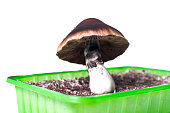The Significance of Controlled Growth
페이지 정보

본문
One of the primary advantages of controlled cultivation is its ability to extend the growing season. By providing a stable and optimal environment, plants can be grown continuously, regardless of the outside weather conditions. This is particularly beneficial for crops that are sensitive specific temperature fluctuations or require particular weather conditions to thrive.

Another significant benefit of controlled cultivation is its efficient irrigation capabilities. By minimizing waste and evaporation, farmers can reduce their water usage while maintaining high crop yields. This is especially important in areas where water is a valuable resource, as it can help to alleviate pressure on local water supplies.
Controlled cultivation also enables farmers to improve crop quality by controlling factors like substrate quality, nutrient levels, and insect management. By growing crops in a specially designed setting, farmers can minimize the threat of crop damage which can compromise nutritional value and reduce yields. Additionally, controlled cultivation allows farmers to implement precise nutrient management strategies, which can enhance the nutritional content of their crops.
The use of controlled cultivation has also been shown to enhance agricultural productivity. By providing optimal growing conditions, plants can reach their full growth potential, resulting in higher yields and improved fruit quality. This is particularly beneficial for crops like leafy greens, which can be harvested repeatedly in a controlled environment.
Furthermore, controlled cultivation has the potential to reduce contamination risks by reducing the risk of contamination. By controlling the environment and minimizing contact between crops and potential contaminants, farmers can produce clean and safe produce.
However, controlled cultivation also has some drawbacks, including its high initial investment costs and the need for advanced technology and knowledge. Additionally, controlled cultivation may require significant energy inputs to power illumination, climate control, and cooling systems.
Despite these challenges, sporenspritze bestellen controlled cultivation has significant potential for improving crop yields, minimizing resource usage, and enhancing food quality. As the world's population expands and develops, demand for food increases, controlled cultivation is likely to play an increasingly important role in addressing global food demands.
- 이전글Téléphone Débloqué : Liberté et Flexibilité pour Vos Communications 25.05.24
- 다음글The Future of Psychotherapy 25.05.24
댓글목록
등록된 댓글이 없습니다.



